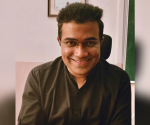Spoken Word Poetry: Rooting for storytelling | Bengaluru News

Bengalurean Prishita Tahilramanigrew up listening to her grandfather’s tales. “He used to recount his experience of the Partition of India and how, when he was eight years old, they had to move to India, stay at a railway station, and then at a refugee camp, before making a home in India,” she says.Listening to his stories, over and over again, kindled in her a love for the spoken word. “Later, I started listening to storytellers on YouTube,” she says. Prishita stumbled into Sriti Jha’s ‘The Invisible Woman’ onKommune India‘s YouTube channel, and was awestruck. “I felt expressed,” she says. Prishita wanted to do something similar; in her own words, “there was a need to feel and make others express themselves.” That’s how her association with Kommune India, one of India’s first ‘Spoken Word Poetry‘ collectives, started.Though some may argue that ‘spoken word and poetry’ are as old as humanity itself or when people began to express themselves through words, the traces of it as a modern-day movement are linked to the urban collectives, especially in the United States. It’s intrinsically connected to the Harlem Renaissance of the 1920s, the Beat Poets of the 1950s, and Black Rights and Civil Rights movements of the later years. However, back home, in India and in Bengaluru the movement gained significant traction only in the past decade or so, coinciding with the rise of social media and online platforms. Spoken Word Poetry blends elements of poetry, theatre, and performance into one, and allows the performer and the listener to experience the story on a much deeper level. The quick connection that the narrator builds with the audience makes it a popular means of storytelling. It is called Spoken Word Poetry because it uses poetic devices, metaphors, imagery and rhythm to evoke emotions in the listener.With multiple platforms like TapeATale, TTT, and UnerasePoetry, to name a few, the community of Spoken Word artists is growing and so is the fan base.Some of the popular artists in India include UnErase Poetry founder Simar Singh, Airplane Poetry Movement co-founder Nandini Varma, Diksha Bijlani, Ishmeet Nagpal, Qais Jaunpuri, Priya Mallik, Jasmine Khurana and Hussain Haidry.Kommune, a platform co-founded by artist and actor Roshan Abbas, is quite popular across the country. “When I started Kommune, it came from a very personal place. I had emptied myself creatively into a film and was looking for inspiration. Saw Sarah Kay perform on YouTube and I realised that across art forms, we often work alone, wrestling with our own doubts and dreams and have no collaboration opportunities or places of inspiration.I wanted to build a space where creators could come together — not just to perform, but to collaborate, to stumble, to cheer each other on,” he says. “Kommune became that living room of artists, where storytellers, poets and musicians could drop their masks and simply share. We weren’t trying to chase viral hits or trends. We just wanted to build a home for authentic, heartfelt expression,” says Roshan on his inspiration to revive the art of sharing stories and poetry.Kommune videos eventually did go viral and started drawing in more people to the Spoken Word Poetry movement. For example, Gaurav Abha Tiwari, who is one of the managers of Kommune’s Bengaluru chapter currently, says that the raw vulnerability, the storytelling, and the passion of Kommune’s viral videos hit him instantly. “That’s when I knew I had to be part of something that gave voice to emotions like that. Soon after, I began attending Kommune events and eventually became more involved with organising it.“These platforms have encouraged people to meet like-minded folks, and find their concerns echo in others’ words. The platforms have become so popular also because they provide a space for people to be unapologetically themselves, without judgment, and give them the space to unload themselves. At Spoken Word Poetry sessions, people usually talk of depression, anxiety, urban loneliness, home, nostalgia, exploitation and abuse, things they are generally not comfortable discussing in their ‘peer groups’. It proves again that sharing your thoughts and concerns with strangers is often much easier than talking to known people.Shamik Sen stumbled upon Spoken Word Poetry at one such open mic sessions in Bengaluru. “A friend dragged me along and I was expecting a casual evening. But when I walked out after the session, I was moved, shaken, and inspired. The format was so new to me …conversational, intense, and incredibly personal. It felt like therapy with a mic.” Shamik, Gaurav and Prishita are now Spoken Word Poetry artists. They have an exciting mix of audience — students, working professionals like lawyers and scientists, artists, introverts, extroverts, and people from all walks of life. “We keep the energy high, the curation honest, and the atmosphere inclusive. Audiences respond best when they feel like they’re in a safe space,” says Gaurav. “It’s never just about performing—it’s about connecting.We build spaces where honesty meets vulnerability, and the crowd doesn’t just watch, they feel. Some laugh, some tear up, some simply breathe it in,” adds Prishita.Though spoken word advocates, the artists maintain a deep connection with written words too. Prishita has a blog and is currently working on an anthology of short stories. Shamik too is working on a story collection. Gaurav has already published a Hindi-Urdu poetry collection.
















